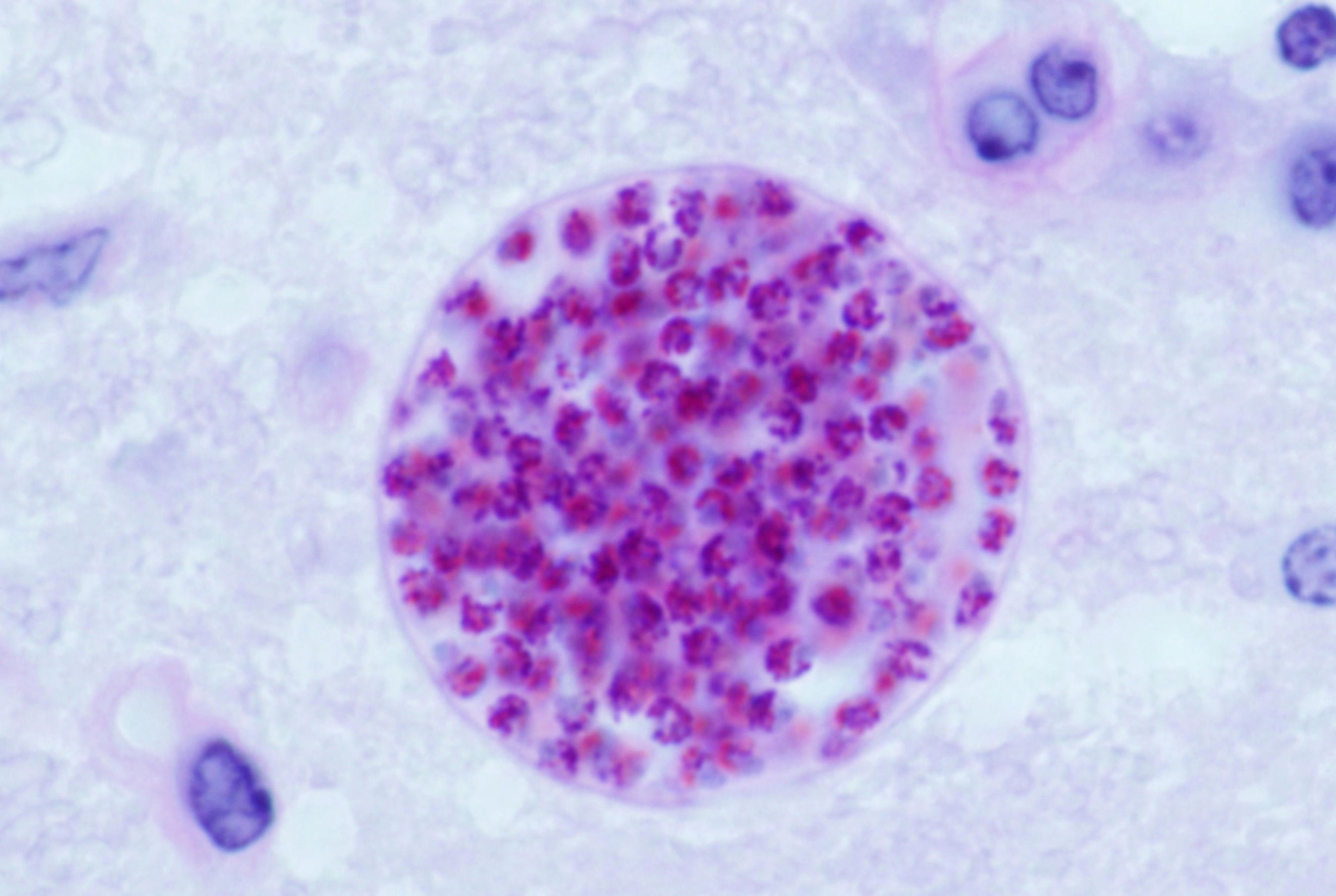This parasite manipulates the minds of wolves, rats—and maybe even you
Toxoplasma gondii infects up to a third of the world’s human population at any given time. It likely has a much wider impact on animal behavior than anyone thought.

What makes a wolf decide to strike out on its own or assert leadership of its pack? That question has long intrigued scientists. Now, a new study shows that gray wolves infected with the parasite Toxoplasma gondii are more likely to become top dog than uninfected wolves.
The finding forces us to think more broadly about what influences how animals act, says study co-author Kira Cassidy, a wildlife biologist with the Yellowstone Wolf Project, a Montana-based nonprofit that oversees research on the predators in Yellowstone National Park.
“We know that behavior is influenced by all sorts of factors, including past experiences, genetics, current circumstances, and social context,” she says. “Now we can add parasites to that list.”
Toxoplasma gondii is a single-celled parasite that infects at least one-third of the world’s human population at any given time with the disease toxoplasmosis. While the infection is usually mild, it can be fatal to the young or immunosuppressed. Toxoplasma can only reproduce in the intestines of domestic or wild cats, yet it is widespread in nature, and can infect any warm-blooded animal. It’s also famous for its ability to manipulate its hosts, most notably in making rodents reckless around house cats. (Read how Toxoplasma affects human brains.)

For the new study, published recently in Communications Biology, Cassidy and colleagues drew on 26 years of behavioral data and blood samples from Yellowstone wolves, going back to when the canines were reintroduced to the park in 1995. They also analyzed the spatial distribution of cougars in the park and blood samples from the big cats, which are known Toxoplasma hosts.
The results showed that wolves living in territories overlapping with cougars were more likely to be infected with Toxoplasma than wolves without feline neighbors.
What’s more, wolves that tested positive for the parasite were 11 times more likely to disperse from their pack and more than 46 times more likely to become a pack leader than uninfected wolves.
These findings aren’t all that surprising to Gregory Milne, an epidemiologist at the Royal Veterinary College in London who was not involved in the study.
“It’s quite consistent with what we know about Toxo in other animals,” he says. “It adds to the growing body of evidence that this parasite can cause meaningful behavior changes.”
Fatal attraction
An animal can become infected with Toxoplasma by eating another infected animal, or through contact with egg-like cysts of the parasite that are shed in cat feces.
If the parasite finds itself in a non-feline host, it can take up residence in different areas of the body, including the brain, and persist there for years. Because the parasite needs to end up in a cat’s gut to reproduce, and it has evolved clever ways to make that happen. (Get the facts on parasites, and why they matter.)
For instance, rodents infected with the parasite are more active and less fearful around predators, such as a domestic cat—delivering the parasite to its preferred home. Remarkably, Toxoplasma-infected mice and rats even lose their fear of the scent of cat urine, and may even become attracted to the smell.
Many of the findings in rodents come from carefully controlled laboratory studies, and only recently have researchers begun investigating the impact of Toxoplasma infection in the wild.

One study found that chimpanzees infected with Toxoplasma are attracted to the urine of leopards, their natural predators. In another study, researchers showed that infected spotted hyena cubs are more likely to approach—and get killed by—lions, according to study co-author Eben Gering, an evolutionary biologist at Nova Southeastern University in Florida. (Read how toxoplasmosis is harming endangered seals in Hawaii.)
“We are just starting to scratch the surface of how the behavioral effects of Toxo infection—known from rodents, confirmed in wild animals, and now seen in highly social animals like hyenas and wolves—influence group dynamics and behaviors that have ecological consequences,” he says.
Risky business
Accumulating evidence suggests that people with toxoplasmosis take more risks than those who are uninfected, for instance by driving more dangerously, which often leads to fatal traffic accidents.
The effects aren’t always negative, though: In one study of college students and business professionals, those infected with Toxoplasma were more likely to either major in business or start their own businesses. And in countries with higher rates of infection, people were less likely to cite fear of failure as a reason for taking on a new entrepreneurial activity.
It's not known exactly how the parasite, a distant relative of malaria, causes such changes in mammals. (Learn about more parasites that mind-control their hosts.)
Milne says that there is some evidence that the parasite may affect neurotransmitters, such as dopamine, or hormones, such as testosterone. It’s also possible that the parasite causes low-grade inflammation, which then impacts behavior.
Whatever the mechanism, it’s becoming clear that parasites—particularly Toxoplasma —play a significant, and underappreciated, role in animals’ lives. Scientists estimate that around 40 percent of animal species are parasites, and they probably comprise a majority of yet-to-be discovered species.
“A lot more of our behavior than the average person would guess could be influenced by this parasite,” Gering says.